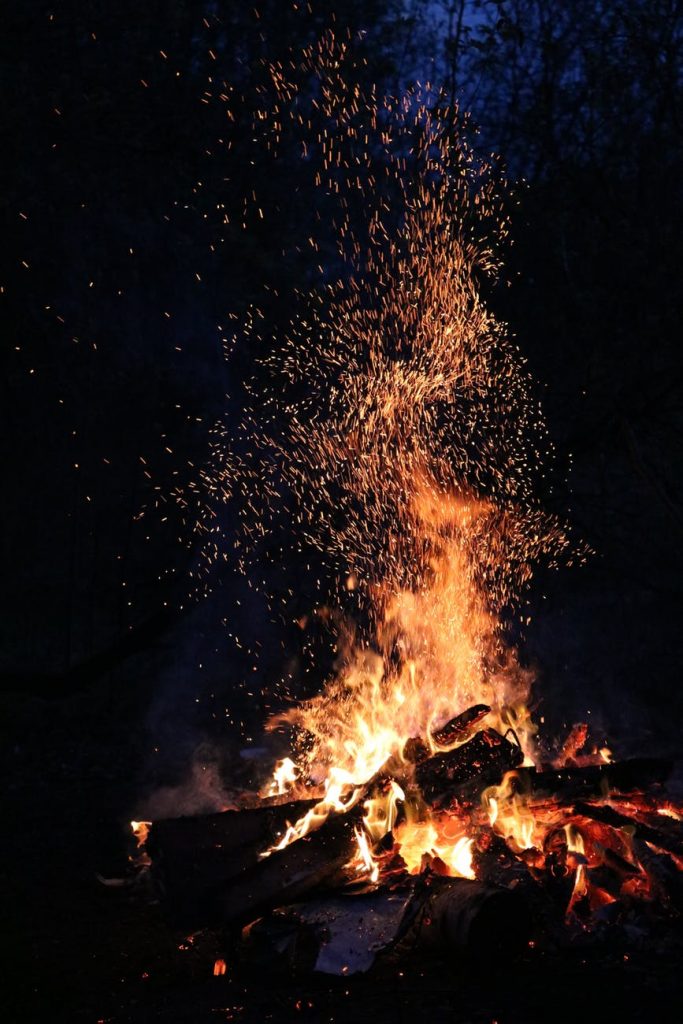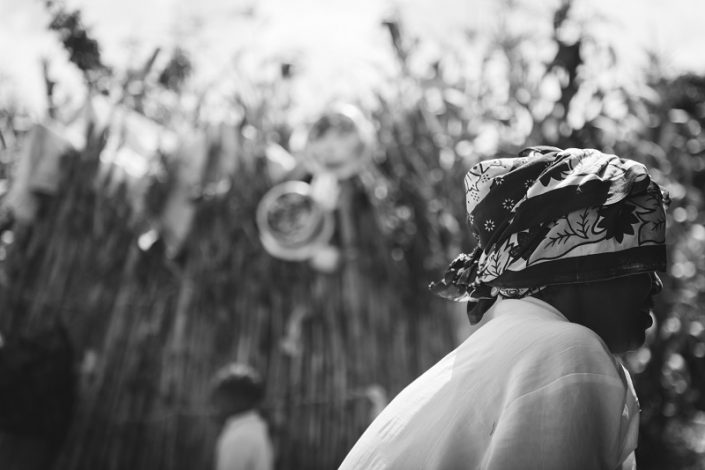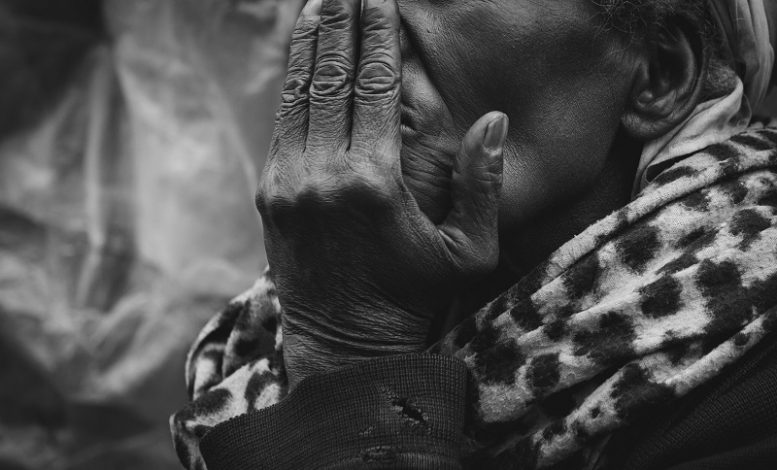She swatted a fly with her palms, savagely.
“Senje! It’s nice seeing you.”
“Nice is your head.”
The fly she had mutilated, dropped from her palm.
“I am not here for blaaalalah!”
Her blaaalalah sucked our attention more than her stunt with the fly.
“Mlamwa Marcella, what is it? What is it, sister in law?”
It was Ma’s calm voice, the one she favoured in times of such a crisis.
“Your other rat is stealing my husband!”
She wiped the remains of the fly on her leso wrapped around her vibrating plus size waist.
“Marcella!”
Ma adjusted her threadbare headdress.
“The other rat, where is she?”
“Kikechi is not a rat.”
Aunty shot a chilling glance that stifled my impulsive protest.
“What is all this?”
Credit: Marifer
Credit: Marifer
Ma was burning inside but feigned patience. I discerned it. It was us that she was holding herself together for. I suspected she had wished that I stay out of this heat as much as she wished I had never learnt of it. Of course, she preferred that adults extinguish adult fire adult to adult, but this was more than she could blow out. I sensed it. I was not budging. Not today. I was going nowhere, in solidarity with the victims of this unprovoked scalding—my younger sister Kikechi and Ma. I was also on high alert such that if Ma’s faded black t-shirt was as much going to be disturbed, even using a ten-foot pole, I knew where I could pick the Made in China stainless steel knife or papa’s forgotten hatchet. And there was also my famous fist that had blacked out an eye and split a lip one time. It had no trouble finding a target and had won me fame and respect in catfights.
“She is chewing my nipples.”
A gasp tore from Ma’s lips.
“Don’t pretend this is news.”
“You will kill me, Marcella.”
“It is even part of people’s whispers in bedrooms because wives are warning husbands of a loose rodent. It has reached far.”
She paused to wipe sweat from her brow with the back of her hand. Ma stared at her the same way that she had stared at the mound covering father’s grave the day he was buried.
“I will fix her. I will fix that rat.”
“Mlamwa.”
“Don’t mlamwa me, mama rodents.”
“Enough!” I shrieked, but she hardly flinched.
“You have trained your rats to go into people’s granaries.”
“I am going to poison any rat that comes into my granary. My farm is my farm for me to till. My nipples have hurt enough!”
“Oh! Jehovah! Marcella, there is a child with us.”
“Doesn’t she have them. You have planted cotton in your head.” She pointed the words in Ma’s face.
Then, she swerved her roof of cornrows in my face
“You have scattered your brain,” she said.
I repressed an urge to slap her big mouth. There was no way she was going scot-free.
“Wait! Is it not uncle to blame? Everyone knows he goes around chewing small girls and people’s wives like toffee sweets.”
“Modesta!”
“She calls us rats; she calls you mother of rodents; why should I shut up?”
“Zip it, you rat!”
“Oh zip it, you cat.”
“Modesta!”
“Just because papa is dead does not justify these names.”
“See the kind of rodents you are rearing in the name of children, Ajumah.”

My fists were clenched now, my eyes dilating like two scarlet fireballs. I held desperately to a dissipating will to turn the other cheek. I regretted not snapping. My eyes followed our family photograph on the wall. I felt a tighter knot in my stomach.
Ma broke down on a chair while Marcella swung her plus size waist restlessly tapping her matriarchal feet on the chirped concrete that was our floor, her hands akimbo. Then her roof of cornrows swerved towards the exit as she rattled off one last threat.
“If you don’t pour water on this fire…”
Her threat, like a flaming ghost, dreadfully hang over our fears as the rest of her trail whiffed away and there was a haughty long silence in its place. Ma, with deep straining lines of contagious sorrow lining her haggard face, had called Kikechi my sister who, seeing our aunt storm in moments earlier, had taken cover in the kitchen behind our house.
“What is all this?”
As she broke into tears, I rushed and took her in my arms. We sat on either side of Ma, the three of us forming a triumvirate of anguish, aloneness and anger.
It was solemn in the house in the days that followed. Kikechi brooded like a child whose happiness had been snatched away. She had not spoken to us from the time Aunty Marcella rattled us and she had hardly left the house in a week. She even lost her appetite and when Ma prepared her favourite groundnut sauce and bananas on a Saturday evening for supper she simply brooded over the food. Ma tried to bring her round, but these attempts appeared to solidify her resolve to disappear into her new world. No appeasements worked. Kikechi was in a world I could not understand, a world she would not let me into, a world with an unimpeachable wall, a world of the depressed. There was an unspoken consensus between Ma and me to let her find herself, hoping that she would become once more that bundle of humour that we adored. On occasions, I heard her hum to the music playing on the radio. This fluttered my heart with excitement even though the songs were usually plaintive.
THERE WAS AN UNSPOKEN CONSENSUS BETWEEN MA AND ME TO LET HER FIND HERSELF, HOPING THAT SHE WOULD BECOME ONCE MORE THAT BUNDLE OF HUMOUR THAT WE ADORED.
Ma was an Omena fish trader at Luanda market, but she couldn’t go about her trade as usual. Senje was influential among the Luanda Omena merchant women. She was their Omena trader’s co.inc chama treasurer and secretary. She had a solid base of lackeys and, with their machinery, had soiled Ma’s name.
It was, Rasto the cattle trader’s wife, Timina who out of genuine friendship had shared details of Aunty Marcella’s plot to slander Ma. And when Ma started hearing things after Timina, she was not surprised that a cock had crowed, and her stature had dropped. It became near impossible for her to even indulge in conversation with other traders. Insults, torrents of them, poured even from the madwoman, Okumutu, who now joked with Ma’s name.
“This is that woman who has told her daughter to fuck her uncle.”
Okumutu was brutal like her insanity.
When Ma screamed that fateful Saturday morning, one week after she had prepared Kikechi’s loved groundnut sauce, I thought we were under attack. We didn’t have much except for a set of four battered reed chairs, an old unvarnished three-legged coffee table with cobwebs underneath, a cupboard with Ma’s treasured chinaware and silverware that only came out on special occasions. There was that Papa’s old National radio that I kept in our room—the one Kikechi listened to plaintive music on. If we were under attack, those must be desperate men.
I found Ma sprawled on the chirped concrete floor. The door was ajar, and it was 3.00 am in the morning. Her ceaseless screaming cracked in my chest like a contagious sickness. There was her dim kerosene lamp lying by her head. I scanned around her and instinctively rushed to shut the door. Then I took the lamp, adjusted the wick up and, as the glow of its undulating flame illuminated the room, my sight caught everything in a flash. My legs grew weak instantaneously. I let go of the lamp and collapsed on Ma. I screamed and screamed until my voice grew hoarse. Then I fainted.
When I opened my eyes, I found myself amidst unfamiliar faces. Gradually, I started making out Ma’s church members. Then I heard Ma’s voice. She was still weeping from somewhere. I groped my hands around me and touched the skirts of a few sympathisers and finally rested them on the rugged edges of a mattress.
I tried to rise but I was still weak. I didn’t even know what time it was, but I heard the swooshing of wind and mowing of cows from a nearby farm. Someone brought me a cup of tea that had so much sugar in it. I sipped as she held the cup over for me. I could not believe I had lost strength even in my arms. My throat was dry, and I felt some pain as I swallowed the tea. A sympathetic old woman brought some sweet potatoes, but they tasted like sand to me.
After my recovery, five days went by like smoke in rain. In those five days, Ma struggled and today was no different. She had been struggling all her life anyway.
“My daughter is not a dead dog.”
She was in a circle, with the council of grey heads, bravely engaging them in an argument. The convened council of grey heads were responsible for cleansing rites and formed the committee for funeral arrangements in our clan. It was a collection of men with a common opinion on everything except monogamy. Most were octogenarians and only ate chicken during their deliberations. Today was the fifth day they were gathering in our home since Kikechi’s suicide that Saturday.
“Woman, it is tradition,” the chief of our town, a man with five wives and countless mistresses proclaimed.
“Yes,” the eldest of my grandfather’s brothers offered his affirmation.
“Suicide is a stubborn dog; it must be buried at night and with no ceremony for it never to return.”
“And don’t stubborn us,” the chief added for good measure.
“We are a Christian home,” Ma persisted in defiance.
“It’s been five days now. In such shame, we should have done it the night after.”
“But you have been stubborn and not produced the heifer, three black goats and thirteen thousand shillings for the soil.”
“There is nothing left. The white sheep is what I had.”
“You have taken us on enough journeys…” the chief roared, and three others joined him in proclaiming the verdict of the grey heads.
“So, we…”
“Have decided…”
“That it happens tonight.”

They had had their way and performed the initial rite of whipping the body 1000 strokes to chase away the suicide spirit. Now they wanted to bury the corpse at night so that the suicide spirit could be blinded into oblivion, but Ma was staunchly opposed to it. She had some support from her pastor and church members who were singing hymns in the house and had been doing the same for the five days deliberations were held, intermittently enjoying snacks and copious amounts of tea ostensibly to water their throats.
I sat taking stock of all this on a plastic chair in a gazebo that had been erected to protect the coffin holding my sister’s remains from rain and other unpredictable weather. Her cold face was indifferently calm underneath the observation glass, beyond the consequences of her tragedy. A garland of gnarled red and white roses was resting on top of the guava tree wooden coffin. I had chosen the two colours for the funeral theme. I let my mind travel to the incident that set all these events in motion. What time had she sneaked from her bed beside mine in our room? Then she had gone and strung a rope on the rafters in the living room. She had left the front door open. It did not make sense. I wished to take revenge on senje. But did it matter now?
I rose and walked towards the deliberating council.
“Allow my mother peace. Let her bury the fruit of her womb in a manner she desires. Have you people ever carried a pregnancy for nine months? Have you had to scream in labour pains? Of course, you have not. You eat chicken, whip a dead body and make unilateral decisions in the name of tradition. You do not ask why she took the rope. I will tell you. She took the rope because a man supposed to act her father raped her. He raped her and said he would kill her if she ever said anything. Yes, it happened. You look like you have seen her rising from that box. I am not shocked. Her own uncle, brother to her father, raped her. He is out of reach for now. We all know he disappeared just after his wife stormed into our house and bashed us with insults. My little teenage sister who was hardly 16 died with the secret that I am now breaking. A death stirred into fruition by those insults. It was those absurd accusations that hammered the last nail in her coffin. She has since also disappeared. The childless couple is gone. I see. You wonder if I am worse than Okumutu. Yes, I am Okumutu times three. I will remain Okumutu times three as long as the truth still makes me Kikechi’s voice. I see. You want proof. I have proof.”
I riffled through my skirt pockets. The old men followed my every move with their bewildered eyes. The chief looked irritated and amused at the same time. Others looked indifferent and some looked like people whose meal had been interrupted by the buzz of a fly. I produced my proof. Kikechi’s crumpled suicide note tacked in a white envelope. I proceeded to read:
“First I must warn you that I have made copies of this and that a copy is in the hands of the Luanda Officer Commanding Post.”
The mention of the police produced some effect on the faces of the men. The chief even fidgeted in his plastic chair. I was almost relishing the moment. But I was not prepared to have the luxury of letting my guard down in this war. A simple moment of weakness meant disastrous consequences. The memory of Kikechi’s face anchored me in courage.
“By the time you read this, I will be as cold as the piece of paper you are holding and the words you will be speaking. Modesta, my sister, execute the instructions herein to the final; then you will have no debt with me. I know there shall be a war, but you are iron. I know they will try to enforce tradition but do not be feeble. This is my will—the will of my frozen breath and my living spirit. Let them not whip my corpse. Let them not bury me at midnight. Ask Ma to forgive me. If Pastor is willing, let him read a verse from the bible for my last rites. I have run a good race. The old men were not there when uncle raped me. They never intervened when senje tore our mother’s heart and our hearts apart like a breakup letter from a disenchanted boyfriend. They never cared after father died. Let them hear a voice from the dead in a living witness. Modesta let me go and be with father. Ask Ma to forgive me. It is well with my soul.”
Ma had been listening pensively with her chin in the palm of her left hand. When I paused, she jerked from her seat and came by my side. She crossed her fingers in mine. Then she started singing—It is well with my soul. She was joined by the pastor from beyond the circle. His blue robe flapping around. The way he clapped thunderously you would think that God himself was opening heaven’s gates for Kikechi.
There was a look of triumph on the faces of all the church members. The ultimate triumph was in the alacrity in their voices which had abandoned sympathy and taken on assertiveness. The church members were collaborating with the pastor. The mood became a coalition of hopes. Okumutu the madwoman appeared from some thicket and led in a strange dance. It was like some spirit, perhaps Kikechi’s spirit, had descended on everyone. Other mourners who had been watching, waiting for the outcome of the deliberations joined in the clapping. The intensity of the singing increased and carried a choral of collectivism from the hearts of the voices. Mother and I were outside the circle. Everyone was outside the circle. It was no longer up to the old grey heads now.




